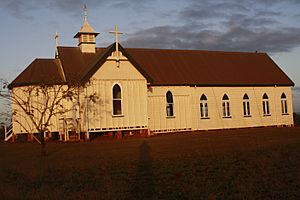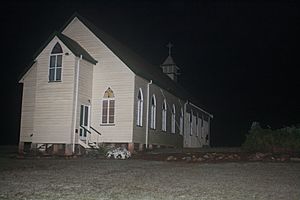Ravenswood Community Church facts for kids
Quick facts for kids Ravenswood Community Church |
|
|---|---|

Ravenswood Community Church, 2011
|
|
| 20°06′00″S 146°53′33″E / 20.1001°S 146.8924°E | |
| Country | Australia |
| Denomination | Union Church (since c. 1985) |
| Previous denomination | Roman Catholic (1871–c. 1985) |
| History | |
| Former name(s) | St Patrick's Catholic Church |
| Status | Church |
| Founded | 21 October 1871 |
| Architecture | |
| Functional status | Active |
| Architectural type | Church |
| Style | Gothic Revival |
| Completed | 1871 |
The Ravenswood Community Church is a special old building in Ravenswood, Queensland, Australia. It used to be a Roman Catholic church called St Patrick's, but now it's a community church for everyone. It was built way back in 1871 by builders named Ross & O'Reilly. This church is so important that it was added to the Queensland Heritage Register on September 24, 1999, which means it's protected for future generations to enjoy.
Contents
History of the Church
The Ravenswood Community Church, which was first known as St Patrick's Catholic Church, officially opened its doors on October 21, 1871. Over the years, the church has been made bigger, with major additions happening in the early 1900s.
Gold Rush and Town Growth
Ravenswood became a town because of gold. Gold was first found in the area in 1868. At first, miners looked for gold in riverbeds, but then they found gold in quartz rocks. It was hard to crush these rocks until a special machine arrived in 1869. This machine helped miners get more gold, which made the town grow.
By the mid-1870s, Ravenswood was a busy place. It had five hotels, shops, a chemist, a baker, and many other businesses. This showed that people believed the town would last.
Building the Church
Around March 1871, people in Ravenswood decided to build a Catholic church. They started collecting money, and many people from different backgrounds helped out. This shows how much the community wanted the church. A small school even opened inside the church soon after it was finished.
The church was built by Ross & O'Reilly, who were local builders. Hugh Ross, one of the builders, also constructed other churches in nearby Charters Towers. These churches look similar to the Ravenswood Community Church.
Challenges and Changes
In 1873, a big storm damaged the church. Some stories say only the back of the building needed rebuilding, while others say the whole church had to be rebuilt.
The Catholic community in Ravenswood grew strong. They had the church, a boarding school, and a convent. Priests from Italy and France visited the town before it became its own parish.
In 1885, Father Flood, the first parish priest, worked to bring the Sisters of Mercy to Ravenswood to open a school. The community helped him raise money. The nuns arrived in 1886, and the first school was likely in the church. Later, a day and boarding school for girls opened in 1890.
During World War II, students from St Patrick's College in Townsville were moved to the boarding school in Ravenswood for safety. After the war, they returned to Townsville. The boarding school and convent closed in 1948. The school building was moved to another town, but the convent stayed until a storm damaged it. Local people then took it apart for its timber.
Community Spirit and Repairs
In 1905, builders Rooney & Company extended the church. Even though it was used, the church started to fall apart. But in 1957, the community raised money for repairs. They fixed the walls, roof, and even rebuilt a part of the church that was damaged by white ants. Then they painted the whole building.
Even after these repairs, the church wasn't used much. But in the mid-1970s, a local couple wanted to get married there. Once again, the community came together to fix it up for the wedding. They replaced windows, painted, fixed things inside, and put down new carpet.
In the mid-1980s, the Catholic Church gave the building to the local council. Since then, the people of Ravenswood, with help from a local mining company, have continued to look after the church. It is now used as a community church for everyone. Special events, like carols by candlelight, are held there, bringing the whole community together.
Recently, the church has been repainted, and the stairs leading to the choir loft have been rebuilt.
What the Church Looks Like
The Ravenswood Community Church is a rectangular building with a pointed roof made of corrugated iron. It sits on a clear hill facing Chapel Street, a little southeast of the town.
Next to the church, on the western side, you can still see some plants and old building pieces from the Mercy Convent that used to be there. A brick entrance leads up to the church from Chapel Street.
The front part of the church has smooth wooden boards on the outside. The back part has a single layer of these boards, with the wooden frame showing on the inside. A small entrance porch sticks out from the front, facing Chapel Street. There are narrow windows on either side of the porch and in its front wall. You'll find similar windows along both sides of the church.
At the very back of the building, there's a curved section which is the sanctuary. On either side of the sanctuary, there are smaller extensions, one of which used to be a sacristy.
Inside, the church has its original wooden pews, a timber and marble altar, a baptismal font, and a confessional. The inside has been painted, and the fittings have been repaired. A new staircase to the choir loft was built recently, and the windows have new frames.
Why the Church is Special
The Ravenswood Community Church was added to the Queensland Heritage Register on September 24, 1999, because it's important for several reasons:
- It shows Queensland's history: The church, built from 1871, helps us understand how Ravenswood grew during the gold rush. It also shows how the Catholic religion spread in regional Queensland, especially in the northern parts.
- It's beautiful to look at: This simple wooden church stands out on the hill and is a well-known landmark in Ravenswood.
- It's important to the community: The people of Ravenswood have always had a strong connection to this church. Many times, the church has survived because the community cared for it and helped with repairs since the 1950s. Today, it's still a place where the community gathers for services and celebrations.
 | John T. Biggers |
 | Thomas Blackshear |
 | Mark Bradford |
 | Beverly Buchanan |


